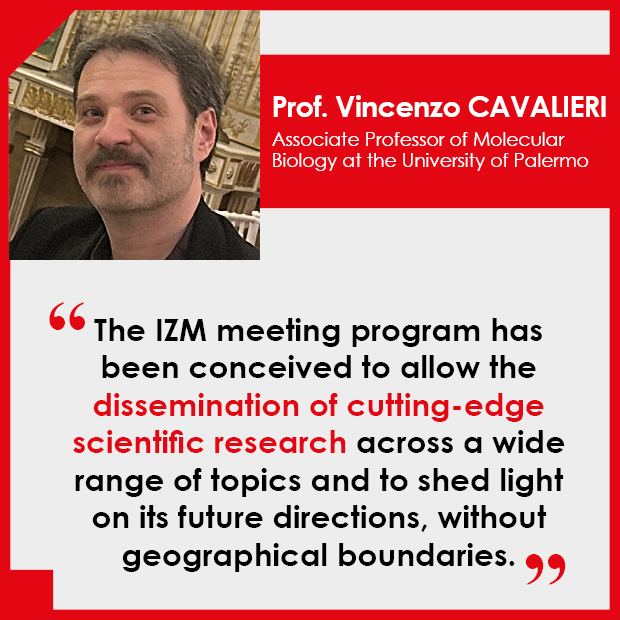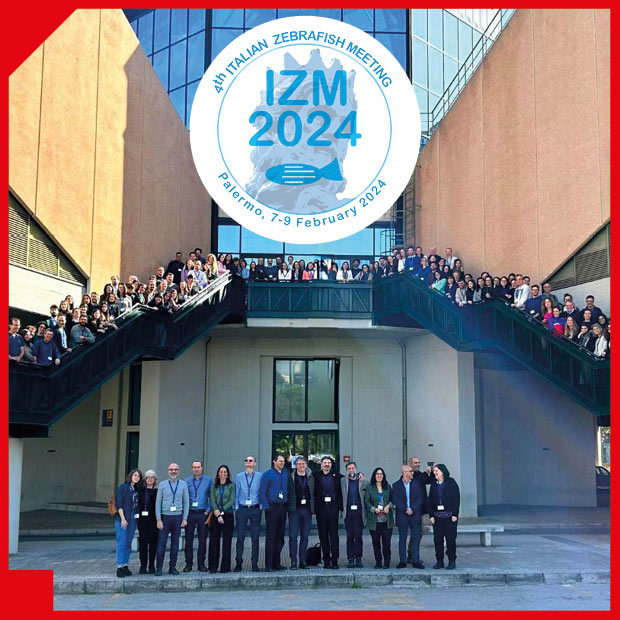
The current version of the Tecniplast website doesn't match your region. Please visit your local website to find information and offerings specific to your country.

The current version of the Tecniplast website doesn't match your region. Please visit your local website to find information and offerings specific to your country.

 Panorama meets Prof. Vincenzo Cavalieri, Associate Professor of Molecular Biology at the University of Palermo, the institute which, last February, hosted the fourth edition of the IZM – International Zebrafish Meeting.
Panorama meets Prof. Vincenzo Cavalieri, Associate Professor of Molecular Biology at the University of Palermo, the institute which, last February, hosted the fourth edition of the IZM – International Zebrafish Meeting.
Let's review with Prof. Cavalieri the topics and achievements of this latest edition, which saw the participation of FGB – Guido Bernardini Foundation as an organizing partner... while awaiting the 2026 appointment in Trento!
The primary aim of the Italian Zebrafish Meeting is to provide an important forum for presentation and discussion of the most innovative and exciting scientific research currently ongoing in Italy using the zebrafish model. The meeting program has been conceived to allow the dissemination of cutting-edge scientific research across a wide range of topics and to shed light on its future directions, without geographical boundaries. Indeed, there were several participants from various parts of the world, including Spain, France, Germany, Hungary, the Netherlands, Switzerland, Israel, and United States of America. Importantly, the meeting had designated time to foster open scientific exchange and informal networking opportunities among participants of all career stages, thus allowing initiation new collaborations and strengthening of existing partnerships.
I believe that these aims were successfully achieved, as testified by the highest participation ever since the first meeting of the series (more than 200 attendants), coupled with the highly positive satisfaction rating expressed by the attendants using the survey feedback questionnaire.
I have over twenty years' experience with the molecular embryology of aquatic organisms, mostly sea urchins, aimed to understand the developmental and epigenetic events that lead to specific gene expression patterns and functions. More recently, here at the University of Palermo, I had the opportunity to conceive and realize an entirely new laboratory focused on using zebrafish as an experimental model. This led me to extend my research interest towards the development of innovative therapeutic treatments in the fields of preventive, regenerative and cancer medicine. In particular, the research that I presented at the meeting deals with the conditioned medium harvested from stem cell culturing, which represents an innovative therapeutic tool against various diseases, due to the high content of growth, trophic and protective factors. The evaluation in vivo of the effects and biosafety of this product is essential, and zebrafish provides an ideal platform for high-throughput toxicological analysis.

My research group assessed the biological effects elicited by the exposure of developing zebrafish embryos to the conditioned medium derived from stem cells extracted from the human umbilical cord, appraising that it comprehensively triggers antioxidant, anti-apoptotic and pro-regenerative effects. To our knowledge, this is the first study comprehensively addressing the effects of a conditioned medium on a whole organism from a molecular, developmental, and behavioural perspective, and we are fairly confident that it will pave the way for future therapeutic application.
This study has been developed in the frame of a collaboration between the University of Palermo and the Azienda Ospedaliera Ospedali Riuniti Villa Sofia-Cervello, and it has been financially supported by the Italian Ministry of Health (Ricerca Finalizzata 2016-NET-2016-02363765).
In my experience, the high standard of competence and collaborative approach of FGB played a very important role in delivering a successful meeting. I definitely would suggest to my colleagues to collaborate with FGB… and in fact, I have already advertised people from Trento, where the next Italian Zebrafish Meeting will take place.